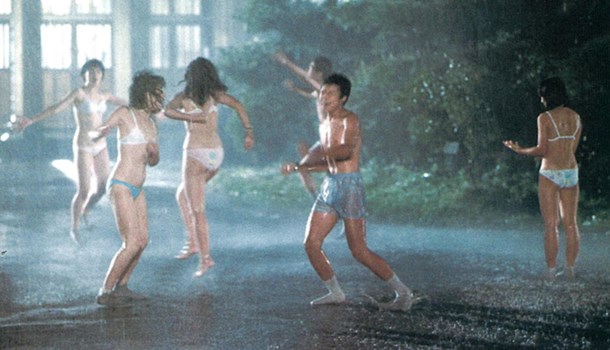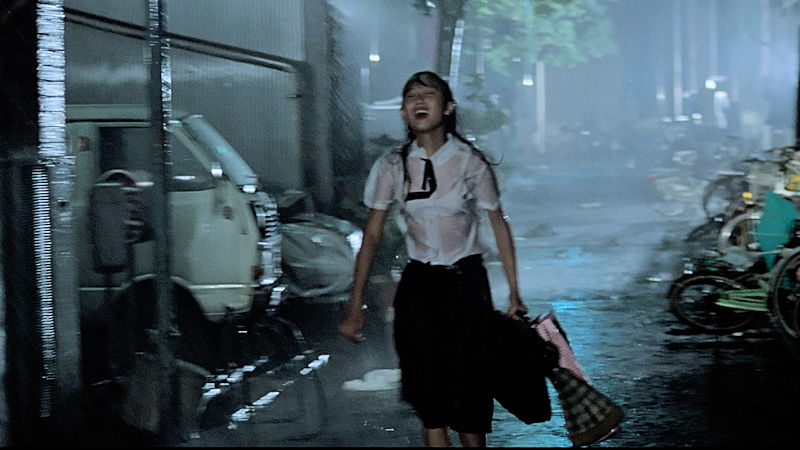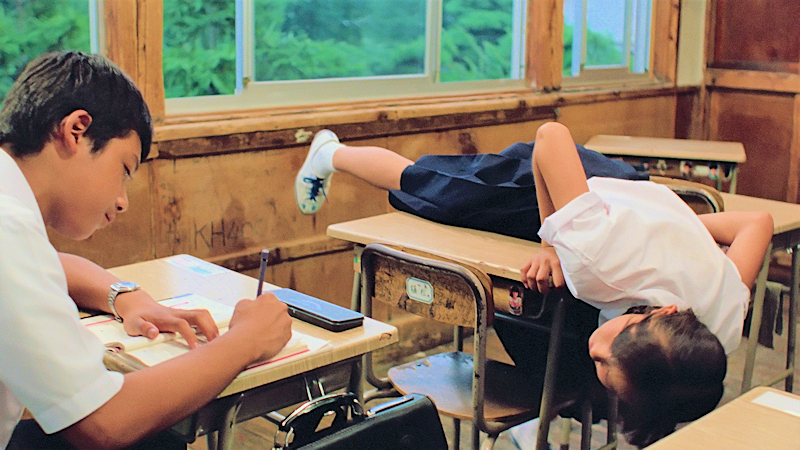
Written by Richard Durrance on 29 Nov 2023
Distributor Third Window • Certificate 18 • Price £17.99
I’ve had a spell of being very bad at watching films that are new to me; ironically perhaps I’ve managed to make weekly pilgrimages to the cinema, but most often these were to see silent films or the current season of very early Michael Powell films; so it was just these films unknown to me I was struggling to get my brain to engage with – not aesthetically, not as a matter of taste - just one of those troughs that at times we get stuck in, just as we might not read much or else listen to any new music. I was in that "need something comforting and not wanting anything new" phase. I guess this is another way of saying: starting a new job takes it out of you and leaves your brain feeling like mush.
But having felt guilt at not getting around to watching the second of Third Window’s Directors Company releases: Door (the first being The Guard from Underground), late Sunday afternoon I said enough was enough and so went straight to their third Directors Company release, Typhoon Club (1985), directed by Shinji Somai, whose only other work I’ve seen is the excellent Sailor Suit and Machine Gun, safe at least in the knowledge that Typhoon Club was held in high regard by those lucky enough to have seen it, and hoped my mushy brain could manage to appreciate it.
In a small suburban school, a storm is brewing, and relationships are starting to fray alongside with the growing pains of life (and that’s not just the students). Then the typhoon hits and a certain madness overtakes everyone, liberating, emancipating and sometimes turning to them to dark actions and thoughts.
For a film that runs to just under two hours Typhoon Club is one in which not much happens in terms of bam-bam-bam plot points, instead it allows the characters to unfold before you slowly. This is by design and direction, where the camera often sits and allows the characters to evolve before you, almost in an Ozu-like way (even in terms of the low camera height); then (unlike Ozu) it may slowly zoom in to quietly emphasise what’s happening.
And what does happen? My synopsis was intentionally rather vague but it’s a pretty true representation of the film, because like so many stories the bare bones of the narrative is not entirely unusual or original. It is the presentation and the acting that slowly teases out some of the tensions, and the exaltations, of our students and even one of their teachers (whose potential mother-in-law is happy to storm into his class mid-teaching to demand to know his intentions towards her daughter) is where the difference is truly felt. How we engage with our characters, how real they feel, if at all, is the point that must either set Typhoon Club apart of not.
Quite where the film is going takes time to develop, in part because of the need for the film to define its characters. Whether that be studious Mikami (Yuichi Mikami), who may or may not quite be in a relationship with Rie (Youki Kudoh); Mikami’s friend, Ken (Shigeru Benibayashi) seems disturbed by a strange homelife and also likes Michiko (Yuka Onishi); Michiko may like Mikami; then you have the dangerous Yasuko (Tomoko Aizawa) who nearly causes the rather strange Akira (Toshiyuki Matsunaga) to be drowned. And..

And this doesn’t really tell you much, because how the characters engage and how the film flows are really what matters here. Mikami seems a relatively sane and intelligent guy, who may be in love with Rie, but is he? Is she with him? Are they really just close friends playing out what they think they should be doing as part of their youth? The point is that all these teenagers flow in and out of each other’s orbits, sometimes for mere moments, but there are always undercurrents that sometimes seethe into darker, more disturbing aspects of growing up, of not understanding or being able to articulate how we feel.
One scene of sexual assault is disturbing because you feel that the attacker doesn’t really understand what they are doing, nor their impact or their effect, but also the mantra they speak, their physical behaviour also suggests that their intention is very different, and the unspoken emotional damage implicit in scenes briefly glimpsed are causing them to act in a way that is contrary to what they want to do, or how they want to be perceived. The scene of sexual assault is important because there’s something very visceral about that which is also neither explicit nor exploitational, instead it focuses remorselessly on the emotions, and emotions are the dead centre of the film.
The typhoon being a metaphor for violent emotions, as well as being a physical reason to trap characters into locations: the students at school, their teacher, Umemiya (Tomokazu Miura) with a sudden reproachment with his in-laws, and Rie having ventured out to Tokyo potentially hooking up with some dodgy bloke, is obvious but it is also effective. And where the film could have become predictable it never is, in part because it always captures a certain energy that's with it from the start: the female students break into the school grounds, and in their swimwear dance to music in the night air. What could be cliche or even voyeuristic because of how they are dressed, never is, because there is an honesty about the performances that never makes the scene feel contrived, and this natural energy is felt throughout the film and throughout the performances.
Equally, though sometimes terrible things happen, Typhoon Club is a film without malice and instead allows us to witness the growth of children to adulthood through an idiosyncratic lens that is never sentimental nor is it patronising. I have to say the teen movie may just be my least favourite film genre - and considering so many of my generation adore 80’s teen movies which I would happily never sit through one second of, makes Typhoon Club all the better for its honesty and lack of bullshit. Again, there’s nothing that suggests anything like the worst type of teen movies vibe: the hey we were cool, or weren’t these times great, or weren’t these times formative. Yes, what happens to the characters may be formative, but it never slaps you in the face with it like the underwear our protagonists throw off at one point in the rain. (Though if hoping for some gratuitous nudity, sorry, you’ll be disappointed because this is symbolic.)
Part of me honestly doesn’t quite know what to make of Typhoon Club. There are moments where you suspect sequences have been edited out or else not filmed because of the shoestring budget, not that this matters, but overall the film’s emotional honestly, humour, and its ability to allow its characters to unfurl before you are to be applauded. The performances, too, manage to stand out but very much as an ensemble, that as I mentioned, seem to float around each other. You feel like these teenagers have grown up around each other, for good or ill, and have their own clear dynamics. True, Yuichi Mikami as the sensible, brooding Mikami may give the best actual performance and it seems odd looking him up that he seemed never to go anywhere, because for all his youth he has a genuine screen presence.
Third Window previous provided us with their Nobuhiko Obayashi at Kadokawa boxset, which provided other 80s teen films and it would be easy to try and compare and contrast to those, but Typhoon Club is a different beast to Obayashi’s excellent work in that set; better then to say that there is something vital to Typhoon Club, even if perhaps it could have been a little shorter. And take it from the arch anti-teen movie reviewer, this one, like Obayashi’s work, is very much of its time but also very unique and more thoughtful than it has a right to be. It presents teenagers as people that feel alive and feel real in how they act, react and engage with one another. That, above all else, has stuck with me.

Something about how Mikami and Rie here communicate struck me as weird but weirdly right, just as people do, with their own peculiarities, patterns and methods to their madness.

Long-time anime dilettante and general lover of cinema. Obsessive re-watcher of 'stuff'. Has issues with dubs. Will go off on tangents about other things that no one else cares about but is sadly passionate about. (Also, parentheses come as standard.) Looks curiously like Jo Shishido, hamster cheeks and all.
posted by Richard Durrance on 12 Feb 2026
posted by Richard Durrance on 10 Feb 2026
posted by Richard Durrance on 07 Feb 2026
posted by Richard Durrance on 03 Feb 2026
posted by Richard Durrance on 27 Jan 2026
posted by Richard Durrance on 19 Jan 2026
posted by Richard Durrance on 08 Jan 2026
posted by Richard Durrance on 17 Dec 2025